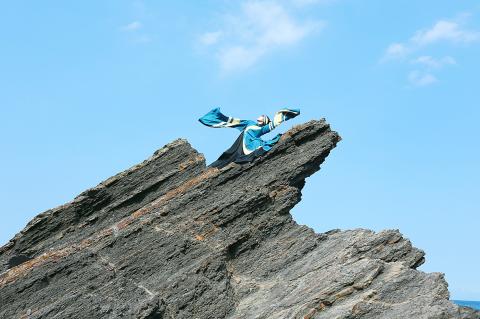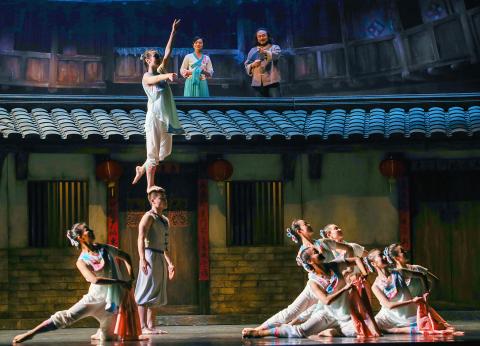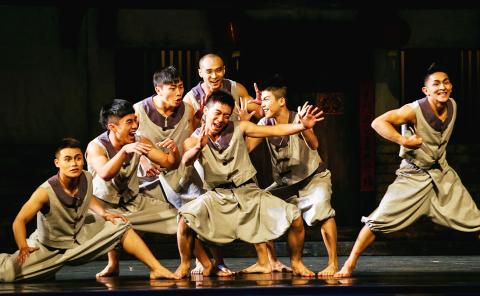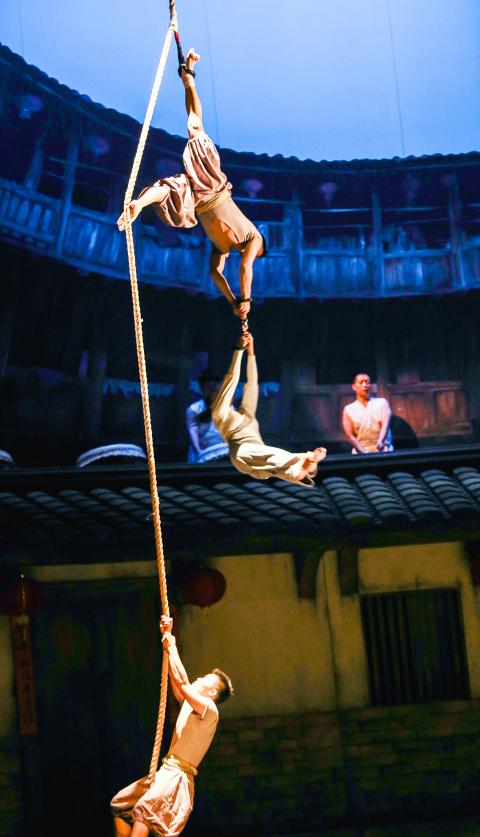The Neo-Classic Dance Company (新古典舞團) opens its new production, The Drifting Fate of Hakka (客風‧漂鳥之歌), an exploration and celebration of Hakka culture, at the National Theater in Taipei tonight for a three-show run.
The show is something of a turning point for the 38-year-old company because it was choreographed by Lu Yi-chuan (盧怡全), one of its former dancers, not the troupe’s founder and artistic director, Liu Feng-shueh (劉鳳學), the doyenne of Taiwan’s dance world.
Liu gained fame as a dance teacher, a dance scholar and something of an anthropologist. She worked for decades in National Taiwan Normal University’s physical education department and then as director of National Taiwan Arts College’s dance department — among other jobs. Her meticulous research in Japan and South Korea that helped her reconstruct the intricacies of Tang, Sung and Ming dynasty dance and music based on documents she found, as well as create new works using those styles.

Courtesy of Neo-Classic Dance Company
Her research into those old dances was part of her path toward creating “modern Chinese dance,” a form that was not heavily influenced by contemporary Western choreographers.
She also spent many years conducting research in Taiwan’s Aboriginal communities and her abiding interest in the impact of ethnic and cultural roots has influenced several of her dance productions, including 1994’s Subtlety in Ethnic Poundings (沉默的杵音) and 2009’s Land of the Clouded Leopard (雲豹之鄉), which drew on the dances and music of Amis Aborigines.
One group in Taiwan that she had not explored artistically was the Hakkas.

Courtesy of Neo-Classic Dance Company
“Hakka dance should not be confined to the Hakka traditional framework, but belongs to the world,” Liu said at a news conference earlier this year to promote the production.
While Liu has continued to teach and choreograph in the decades since she officially “retired,” at 90 she felt it was time to pass the torch to a younger choreographer while she acted as executive producer for the show and wrote the storyline.
Lu, who is himself Hakka, danced with the troupe for 11 years. In 2004, Liu encouraged him to begin choreographing. He said he drew upon both traditional and modern Hakka culture for The Drifting Fate of Hakka. Lu was known for his dynamic performances and his choreography for this production fully reflects that style.

Courtesy of Neo-Classic Dance Company
Together Liu and Lu have created a big, multifaceted production, which is divided into four acts to introduce traditional rituals, the history of the Hakka migrations and the conflicts they often faced with their neighbors and the adaptation to a modern, settled culture. The acts are titled: “Offering to the Heavens: An Eternal Dialogue Between the Heaven and Earth;” “The Way Out: A Historical Path;” “The Hakka Style: A Thousand-Year-Old Voice in Modern Tones;” and “Drifting Fate: The Drifting Bird Settles Down.”
Well-known Taiwanese composer and academic Wen-pin Hope Lee (李和莆) was drafted to compose the score for acts I, II and IV, while Hakka folksinger/rocker/songwriter Hsieh Yu-wei (謝宇威) was asked to contribute songs for Act III. Both men have won Golden Melody Awards for their works and have worked with a variety of other artists in their career. However, Hsieh said working with dancers was a new experience for him. He will be performing in Act III, alongside singer Huang Pei-shu (黃珮舒).
Lu’s action-packed work requires a lot of performers, so in addition to the company’s 16 dancers, nine students from National Taiwan College of Performing Arts’ (國立臺灣戲曲學院民俗技藝學系) Department of Acrobatics and Dance were recruited, as well as drummers and other members of the Team-Win Lion Dance Theater (廷威醒獅劇團), which was founded by Chen Chin-yi (陳晉億) and his two elder brothers in 2000.

Courtesy of Neo-Classic Dance Company
The stage set for The Drifting Fate of Hakka is stunning. It is designed to resemble a slice of a tu lou (土樓), the traditional three or four-story Hakka walled villages found in China’s Fujian and Jiangxi provinces. The multi-family structures were designed to be easily defensive, so most are circular in shape, though there are some square ones as well.
The set has a ground floor wall with three doors and a tiled roof, which masks a second-floor walkway used by the singers and occasionally the dancers. Behind this structure, a blown-up photograph of the interior of a tou lou stretches on a screen for two more stories.
There will be an introduction to the piece in the lobby of the National Theater 30 minutes before the start of each show and then the production team will take part in a question and answer session following Sunday’s matinee.

June 9 to June 15 A photo of two men riding trendy high-wheel Penny-Farthing bicycles past a Qing Dynasty gate aptly captures the essence of Taipei in 1897 — a newly colonized city on the cusp of great change. The Japanese began making significant modifications to the cityscape in 1899, tearing down Qing-era structures, widening boulevards and installing Western-style infrastructure and buildings. The photographer, Minosuke Imamura, only spent a year in Taiwan as a cartographer for the governor-general’s office, but he left behind a treasure trove of 130 images showing life at the onset of Japanese rule, spanning July 1897 to

In an interview posted online by United Daily News (UDN) on May 26, current Chinese Nationalist Party (KMT) Chairman Eric Chu (朱立倫) was asked about Taichung Mayor Lu Shiow-yen (盧秀燕) replacing him as party chair. Though not yet officially running, by the customs of Taiwan politics, Lu has been signalling she is both running for party chair and to be the party’s 2028 presidential candidate. She told an international media outlet that she was considering a run. She also gave a speech in Keelung on national priorities and foreign affairs. For details, see the May 23 edition of this column,

The Taiwan People’s Party (TPP) on May 18 held a rally in Taichung to mark the anniversary of President William Lai’s (賴清德) inauguration on May 20. The title of the rally could be loosely translated to “May 18 recall fraudulent goods” (518退貨ㄌㄨㄚˋ!). Unlike in English, where the terms are the same, “recall” (退貨) in this context refers to product recalls due to damaged, defective or fraudulent merchandise, not the political recalls (罷免) currently dominating the headlines. I attended the rally to determine if the impression was correct that the TPP under party Chairman Huang Kuo-Chang (黃國昌) had little of a

At Computex 2025, Nvidia CEO Jensen Huang (黃仁勳) urged the government to subsidize AI. “All schools in Taiwan must integrate AI into their curricula,” he declared. A few months earlier, he said, “If I were a student today, I’d immediately start using tools like ChatGPT, Gemini Pro and Grok to learn, write and accelerate my thinking.” Huang sees the AI-bullet train leaving the station. And as one of its drivers, he’s worried about youth not getting on board — bad for their careers, and bad for his workforce. As a semiconductor supply-chain powerhouse and AI hub wannabe, Taiwan is seeing